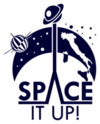Spoke 9 activities overview
Spoke 9 - Habitat space and science
Spoke 9 advances scientific understanding and technological development in support of planetary exploration, extraterrestrial habitability and human life in space. Its activities integrate atmospheric science, planetary geology, astrobiology, resource mapping, space medicine, bioregenerative systems and experimental prototyping, forming a multidisciplinary effort that connects planetary environments with human needs for long-duration missions.
A first research direction focuses on atmospheres beyond Earth, studying plasma–dust interactions, the structure and evolution of exospheres and the climatology of planets such as Mars.
This work examines conditions relevant to habitability and supports the development of aerodynamic models and sensor prototypes for future descent and surface operations. In parallel, the Spoke investigates the lithosphere of the Moon and Mars, analysing their geology, geomorphology, mineralogy, chemistry and geophysics. These studies evaluate the habitability potential of extraterrestrial sites and address risks associated with robotic and human operations, also leveraging terrestrial analogs to assess planetary processes and operational constraints.
Complementing these efforts, Spoke 9 examines the biosphere from an astrobiological perspective by developing methods and techniques for detecting life signatures in extreme analog environments. Experiments are carried out in facilities that simulate space conditions to determine physicochemical limits of life, understand the evolution of potential extraterrestrial habitats and support future Mars Sample Return missions. The exploration scope expands further toward exoplanets, through studies of the structure and atmospheres of outer planets and nearby exoplanetary systems, including the development of sensors, remote-sensing concepts and propulsion-related technologies that may shorten travel times to distant bodies.
The Spoke also advances research on planetary resources, analysing lunar, martian and asteroid meteorites to evaluate their mining potential and identify materials relevant for in-situ resource utilization. Mineralogical and geochemical studies are paired with the development of mining concepts, tools and methods for extracting volatiles and other resources fundamental for long-term human settlement. Investigations of terrestrial analogs support the testing of mission protocols and technologies, while resource mapping activities integrate global datasets and portable instrumentation to identify and characterise potential resource deposits on the Moon and Mars.
Another core area addresses human life science and space medicine, examining physiological, biological, psychological and molecular responses to space environments. Research investigates motor, neural, endocrine and cardiovascular adaptations; identifies biomarkers of impairment; and studies the effects of altered gravity, radiation, sensory deprivation and isolation on cognition, emotion and mental performance. Parallel studies explore radiation-induced damage and its countermeasures, molecular mechanisms perturbed by space exposure and the development of strategies to mitigate health risks. The Spoke also develops advanced bioengineering approaches, including sensors for health monitoring, algorithms for assessing physical and mental readiness, artificial-gravity countermeasures and methods for 3D bioprinting of biological tissues in space.
In addition to fundamental and biomedical research, Spoke 9 develops technologies supporting human life in extraterrestrial habitats. This includes controlled systems for producing fresh food, studies on plant resistance to radiation and gravity variations, and the development of bioregenerative life-support systems that recycle organic waste into substrates and fertilizers. Further work investigates the use of lunar and martian regolith as a growth medium, integrating it with biological components to create viable substrates for cultivation.
These scientific and technological developments converge in the Spoke’s experimental activities dedicated to prototyping and characterizing extraterrestrial environments and human adaptation mechanisms. Research integrates geological, mineralogical and geochemical analyses of meteorites and terrestrial analogs with resource mapping, identification of ISRU-relevant deposits and laboratory simulations of planetary environments. Experiments also explore physiological and cellular responses to simulated microgravity, metabolic and cytoskeletal alterations, early biomarkers of impairment and the validation of lab-on-chip technologies for biological testing in space-like conditions. Bioengineering solutions, countermeasures to sensory and motor deficits and advanced exercise protocols for long-duration missions are also developed and assessed
Research activities Details
Publications
2025
Journal publications:
- eeee
Conference publications:
- eee
2025
Journal publications:
- eeee
Conference publications:
- eee
Spoke 9 - Habitat space and science
Spoke 9 advances scientific understanding and technological development in support of planetary exploration, extraterrestrial habitability, and human life in space. Its activities integrate atmospheric science, planetary geology, astrobiology, resource mapping, space medicine, bioregenerative systems, and experimental prototyping, forming a multidisciplinary effort that connects planetary environments with human needs for long-duration missions.
A first research direction focuses on atmospheres beyond Earth, studying plasma–dust interactions, the structure and evolution of exospheres and the climatology of planets such as Mars. This work examines conditions relevant to habitability and supports the development of aerodynamic models and sensor prototypes for future descent and surface operations.
In parallel, the Spoke investigates the lithosphere of the Moon and Mars, analysing their geology, geomorphology, mineralogy, chemistry and geophysics. These studies evaluate the habitability potential of extraterrestrial sites and address risks associated with robotic and human operations, also leveraging terrestrial analogs to assess planetary processes and operational constraints.
Complementing these efforts, Spoke 9 examines the biosphere from an astrobiological perspective by developing methods and techniques for detecting life signatures in extreme analog environments. Experiments are carried out in facilities that simulate space conditions to determine physicochemical limits of life, understand the evolution of potential extraterrestrial habitats and support future Mars Sample Return missions. The exploration scope expands further toward exoplanets, through studies of the structure and atmospheres of outer planets and nearby exoplanetary systems, including the development of sensors, remote-sensing concepts and propulsion-related technologies that may shorten travel times to distant bodies.
The Spoke also advances research on planetary resources, analysing lunar, martian and asteroid meteorites to evaluate their mining potential and identify materials relevant for in-situ resource utilization. Mineralogical and geochemical studies are paired with the development of mining concepts, tools and methods for extracting volatiles and other resources fundamental for long-term human settlement. Investigations of terrestrial analogs support the testing of mission protocols and technologies, while resource mapping activities integrate global datasets and portable instrumentation to identify and characterise potential resource deposits on the Moon and Mars.
Another core area addresses human life science and space medicine, examining physiological, biological, psychological, and molecular responses to space environments.
Research investigates endocrine, motor, neural, and cardiovascular adaptations; identifies biomarkers of impairment; and studies the effects of altered gravity, radiation, sensory deprivation, and isolation on cognition, emotion, and mental performance. Parallel studies explore radiation-induced damage and its countermeasures, molecular mechanisms perturbed by space exposure, and strategies to mitigate health risks.
The Spoke also develops advanced bioengineering approaches, including sensors for health monitoring, algorithms for assessing physical and mental readiness, artificial gravity countermeasures, and methods for 3D bioprinting of biological tissues in space.
In addition to fundamental and biomedical research, Spoke 9 develops technologies supporting human life in extraterrestrial habitats. This includes controlled systems for producing fresh food, studies on plant resistance to radiation and gravity variations, and the development of bioregenerative life-support systems that recycle organic waste into substrates and fertilizers. Further work investigates the use of lunar and martian regolith as a growth medium, integrating it with biological components to create viable substrates for cultivation.
These scientific and technological developments converge in the Spoke’s experimental activities dedicated to prototyping and characterizing extraterrestrial environments and human adaptation mechanisms. Research integrates geological, mineralogical and geochemical analyses of meteorites and terrestrial analogs with resource mapping, identification of ISRU-relevant deposits and laboratory simulations of planetary environments. Experiments also explore physiological and cellular responses to simulated microgravity, metabolic and cytoskeletal alterations, early biomarkers of impairment and the validation of lab-on-chip technologies for biological testing in space-like conditions. Bioengineering solutions, countermeasures to sensory and motor deficits, and advanced exercise protocols for long-duration missions are also developed and assessed



